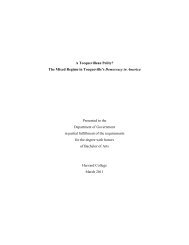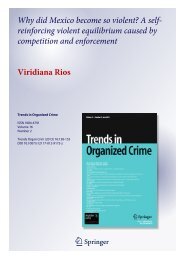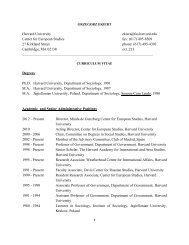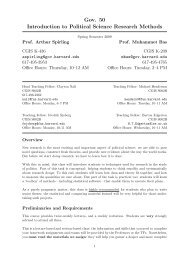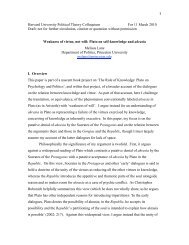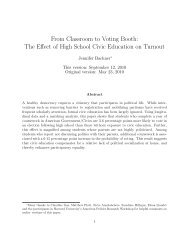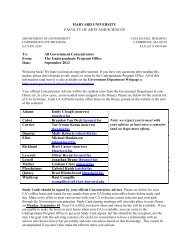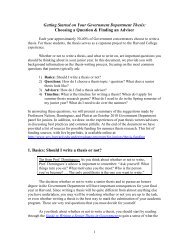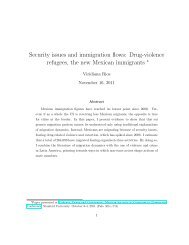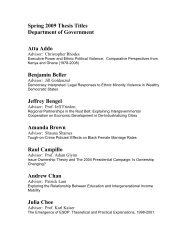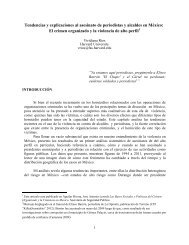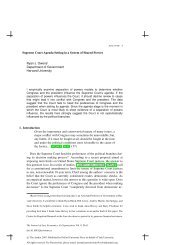Why are Mexican mayors getting killed by traffickers? The dynamics ...
Why are Mexican mayors getting killed by traffickers? The dynamics ...
Why are Mexican mayors getting killed by traffickers? The dynamics ...
Create successful ePaper yourself
Turn your PDF publications into a flip-book with our unique Google optimized e-Paper software.
‘Well, first I pray to God every day and at every moment. <strong>The</strong>n, I do not denounce,<br />
I do not see, I do no listen besides, I do not even have the [constitutional] mandate<br />
to prosecute drug <strong>traffickers</strong>! Finally, at my home, I talk to God again 1 ”<br />
Recent years have seen the mutation of <strong>Mexican</strong> organized crime into a politically violent<br />
actor. In 2010 elections, <strong>Mexican</strong> drug <strong>traffickers</strong> made clear that organized crime was not going<br />
to be a simple political spectator anymore. <strong>The</strong>y attempted to change political preferences<br />
<strong>by</strong> prohibiting the press to cover stories or <strong>by</strong> openly funding their favorite candidates; they<br />
tried to reduce electoral turn out via blatant intimidation; they succeeding selecting candidates<br />
either <strong>by</strong> assassinating the opposition, or <strong>by</strong> terrifying politicians until they withdraw from the<br />
competition. If the previous actions were not effective, they just <strong>killed</strong> politicians. Political<br />
violence became the norm. In 2010, 26 <strong>mayors</strong> were assassinated, at least 126 more were death<br />
threatened, 8 journalists were <strong>killed</strong> or disappe<strong>are</strong>d, and 411 policemen were murdered. Some<br />
political parties were unable to compete in local elections because of “a lack of braveness (El<br />
Universal 2010)” of the potential candidates. Complete towns remained without de facto authorities,<br />
as <strong>mayors</strong> and policemen frequently ran out of office, terrified.<br />
Yet, just recently <strong>Mexican</strong> drug traffic organizations (DTOs) were commonly referred as the<br />
counter-case of political Colombian DTOs. Mexico’s organized crime was notoriously disinterested<br />
in politics (Resa Nesateres, 2006). Under this traditional narrative, <strong>Mexican</strong> kingpins<br />
were portrayed as unsophisticated but clever dealers who knew what was good for business<br />
(Bunker and Sullivan 2001). <strong>The</strong>y did not wanted people fighting in the streets, neither did<br />
they wanted to take visible positions in politics; they were there for the money. <strong>Mexican</strong>s were<br />
not politically involved criminals, they were businessman.<br />
In this paper, I provide an explanation for the abrupt change in the relationship between<br />
criminals and politicians. This is a paper about how organized crime and politicians interact.<br />
I challenge the traditional “silver-or-lead” approach to understand the political/criminal nexus<br />
–according to which as <strong>traffickers</strong> become more powerful, they also become more politically<br />
visible, and they increasingly force politicians to decide between accepting bribes (silver), and<br />
being assassinated (lead). I show that criminals’ political violence does not necessarily come<br />
from an increase in the power of <strong>traffickers</strong> versus politicians. My story is able to explain why<br />
Mexico’s corruption outcomes have changed even if, as I show, <strong>traffickers</strong> have actually become<br />
weaker.<br />
<strong>The</strong> standard Silver-or-bribe narrative fails to comprehend corruption outcomes because it<br />
does not disentangle the factors that determine corruption supply versus those that determine<br />
corruption demand. Corruption mechanics, I argue, <strong>are</strong> a bargaining game between a corruption<br />
supplier (i.e. politicians willing/able to be corrupt) and a corruption demander (i.e. organized<br />
1 Mayor of Pueblo Nuevo, Durango, when asked what he do to keep himself alive (Abrego 2010)<br />
2



